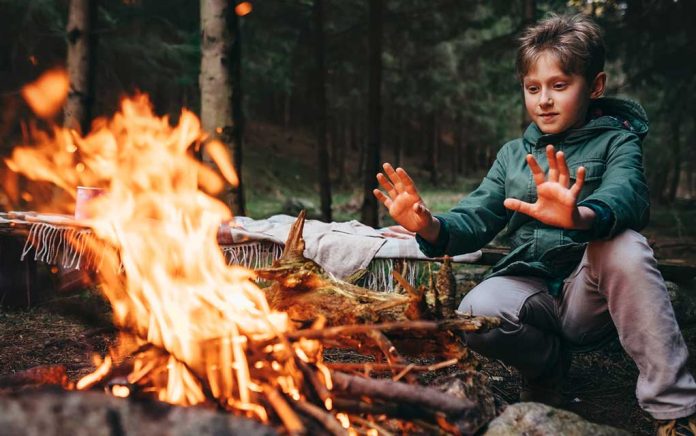(SurvivalDaily.com) – Kids are very important — after all, they are our future. It only makes sense to teach them how to survive in a crisis and how to hone basic survival skills. Childhood just happens to be one of the best times for them to learn because they’re so receptive to age-appropriate knowledge. So, how can you educate your kids on what to do and when to do it? Follow this three-step plan.
Teach Them How To Become Aware
Kids can sometimes be blind to their surroundings. That’s not a red flag for vision issues or anything — they just haven’t developed the ability to read their environment yet. But don’t be fooled; this is the case with many adults, too.
Awareness is a skill that can be learned and trained. And training doesn’t have to be extensive, either; it can be as simple as playing the alphabet game while on the road. This kind of game shows them how to look for and notice very specific (or important) objects within their environment. What you designate as “important” is up to you.
Of course, that isn’t to say kids can’t be observant at all. In fact, they often notice far more than adults realize, but they don’t necessarily process it in a mature way. They might not understand that what someone is doing is dangerous, or that it’s a red flag to run away and get help (e.g., playing unsafely with a gun).
You can hone this part of awareness by talking about what the people are doing around you, why it’s unsafe, and how to respond or do it safely instead. This includes educating them on emergency exits, police officers, escape routes, self-defense, and staying calm in a crisis — or even knowing when to run away. This WILL help if SHTF.
Run Safety Drills
Safety drills should be conducted regularly. Not only do they drive home the importance of having a plan, but they also ensure kids know what to do in the event of an earthquake, tornado, or hurricane (or even a house fire). You can adjust drills as needed to better apply to outside threats, such as terrorism or civil breakdown, as needed. Use age-appropriate lessons that teach kids what to do if their family is under attack.
Most importantly, never be monotonous: change up the drills. Your goal is to repeat them, but mix them up just enough to ensure that kids have a good sense of what to do when things don’t go as planned. There needs to be a sense of improvisation to better prepare them for anything.
Tell Them Why It Matters
You know why you’re prepping, so why shouldn’t your kids? Explain to them why you’re doing it and why it’s so important — but keep it age-appropriate. A frank conversation about a terror attack might be okay for an older teen, yet seriously frighten a child under the age of six. Honesty is important, but you should choose your words carefully and aim to empower, not stir fear.
A child’s imagination is wild and adventurous, so be sure to explain everything that you need to without letting them imagine the worst possible scenarios. Fear will cause unnecessary stress and make it harder for kids to learn.
Answer Their Questions
Kids have a lot of questions. It’s okay to answer these to the best of your ability as long as your answers are appropriate for their maturity level. Keep your words simple, stick to the facts, and don’t be afraid to say you don’t have an answer. You can always offer to do some research and find out!
Plan for Emergencies With Them
Don’t be afraid to make your kids part of the prepping process. Ask for their input, use their good ideas, and let them get creative now and again. Kids can be very intuitive, and often, they’ll bring about ideas you didn’t think of. Remember to help when they struggle to understand, and don’t get frustrated. This will only cause them to pretend like they understand, which does them no good.
A great way to get kids involved in planning is to help them create age-appropriate bug out bags. This will also give them a sense of security, making them feel important and part of the team. You can even let them sneak in a few favorite snacks to help ease the stress when a crisis unfolds.
The Truth
Families prep together and usually, bug out together, too. You want your kids to be prepared and confident when SHTF, and that’s best accomplished via training. But don’t forget that teaching survival skills isn’t just about group survival. In the tragic event that something happens to you in a crisis, and kids need to strike out on their own, what you teach them now could literally keep them alive.
Copyright 2021, SurvivalDaily.com

















